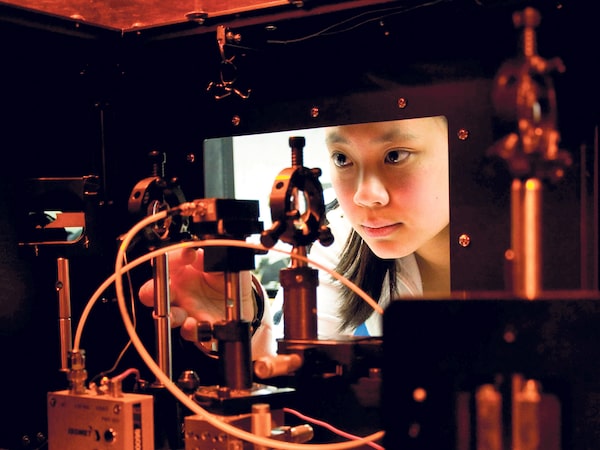
Student uses equipment in Algonquin College’s MakerSpace.SUPPLIED
Learning by doing has long been a catch phrase for mastering new tasks. It’s the primary philosophy at Algonquin College, where learners receive hands-on experience with the latest technology – and graduates are prepared to enter a highly competitive job market.
“Experiential learning fosters highly effective and capable talent,” says Kristine Dawson, Algonquin’s associate vice president, Experiential Learning & Innovation. “It’s in the DNA of a polytechnic institution like Algonquin College to conduct applied research, train the employees of tomorrow and provide them with the skills to be successful in the labour market.”
With physical campuses in Ottawa, Pembroke and Perth as well as an online format through the AC online campus, Algonquin is helping feed the global tech talent pipeline through its School of Advanced Technology. With its three departments – Applied Science and Environmental Technology, Information and Communication Technology, and Mechanical and Transportation Technology – the school offers innovative programming developed in consultation with industry partners, including Artificial Intelligence Software Development, Cyber Security Analysis and Bachelor of Information Technology degrees.
Algonquin College hosts 23 laboratories where learners not only engage in hands-on learning using industry standard tools but also support industry-driven research.
In addition, there is a strong focus on social innovation and the use of technology to support community outcomes, says Ms. Dawson. For example, in partnership with the Children’s Hospital of Eastern Ontario (CHEO), the college’s Social Innovation (SI) Lab launched insightScope, a systematic review software platform that leverages global online communities and crowdsourcing to speed up a normally slow process.
The reviews use a systematic approach to identify, select and analyze data from a wide range of studies to help answer specific health-related questions, such as the need for a new treatment. But the sheer volume of unique sources can be a major challenge for researchers.

Algonquin College president and CEO Claude Brulé (middle), pictured at Parliament with MP Anita Vandenbeld (centre right), alongside distinguished students of the insightScope project.SUPPLIED
Kevin Holmes, senior program manager of the SI Lab, says research projects that are accepted by insightScope are loaded onto the program and promoted to the medical and research community. People with the right skills and aptitude then form a team that takes on the project.
Since 2019, insightScope’s affiliated scientists, researchers and medical students have completed 653,190 assessments on 148 approved projects. The program currently has 1,042 active users.
“InsightScope is building new collaborations around the world, which is a goal of many people doing health research,” says Mr. Holmes. “We are finding that this tool is bringing people together and they’re learning about one another and then collaborating on studies.”
The speed at which insightScope is able to perform systematic reviews is due to a combination of screening by human team members, coupled with machine learning algorithms that can reduce the need for human reviews by up to 40 per cent. Dozens of Algonquin College students, in programs ranging from software development to graphic design, worked alongside world-class researchers from CHEO to help build and refine the platform.
The value of insightScope was demonstrated shortly after the outbreak of the COVID-19 pandemic in 2020 when, faced with a shortage of personal protective equipment in hospitals, medical authorities in Canada needed to synthesize the available research on decontamination of PPE. Multiple systematic reviews, including thousands of papers, were completed in weeks. The information was shared with health authorities across Canada and globally.
“That project not only demonstrated the need for fast results when a global pandemic strikes but also that scientific rigour need not be sacrificed at a time like that, which is the basis of our platform: scientific rigour at speed and scale by using crowdsourcing and artificial intelligence,” says Mr. Holmes.
Advertising feature produced by Randall Anthony Communications with Colleges and Institutes Canada. The Globe’s editorial department was not involved.